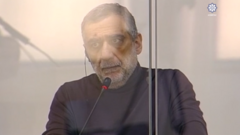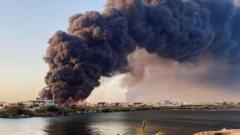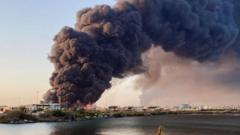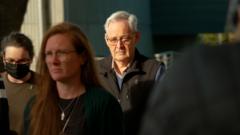Vardanyan's trial raises concerns about the treatment of Armenian leaders and political prisoners amidst a fragile peace process.
Billionaire Ruben Vardanyan's Fate Hangs in Balance Amid Azerbaijani Peace Deal

Billionaire Ruben Vardanyan's Fate Hangs in Balance Amid Azerbaijani Peace Deal
Ruben Vardanyan, an Armenian billionaire facing war crime charges in Azerbaijan, risks being overshadowed by a historic peace negotiation between Armenia and Azerbaijan.
On trial in Baku, Azerbaijan, billionaire Ruben Vardanyan finds himself in a precarious position as Armenia and Azerbaijan finalize a potentially transformative peace deal. Vardanyan, a prominent figure in Armenia's business landscape and a former de facto leader of Nagorno-Karabakh, is one of sixteen former ethnic Armenian leaders facing serious charges, including war crimes, waged against them by Azerbaijani authorities.
Vardanyan, who made significant contributions to philanthropy and education in Armenia, is accused of planning and waging war, with allegations suggesting a possible life sentence. Disturbing images from the courtroom displayed visible bruises on his forehead, raising questions about his treatment while in custody. Azerbaijan has denied allegations of torture and claims to be respecting his rights.
Once considered a progressive figure in the finance community, Vardanyan's life took a dramatic turn after he relocated to Nagorno-Karabakh in September 2022, amid escalating tensions between Armenia and Azerbaijan. His arrival coincided with a blockade of the region, leading to severe shortages of essential supplies. He later renounced his Russian citizenship, marking his deep commitment to the Armenian cause.
As Azerbaijan assumed control of Nagorno-Karabakh in September 2023, Vardanyan attempted to flee to Armenia but was detained in the process. Since then, he has spent much of his time in solitary confinement, staging hunger strikes to protest the judicial proceedings against him.
Critics of the trials have dismissed them as politically motivated, asserting they are attempts to suppress dissent against Azerbaijan's regime. Furthermore, the ongoing peace negotiations between Armenia and Azerbaijan do not incorporate the fates of political prisoners, worrying many, including Vardanyan, who believes their trials represent a profound threat to all Armenians.
As Vardanyan returns to court this week, apprehension grows within the Armenian community about how the peace deal may divert crucial attention away from the plight of those on trial. Armenian leaders have stated that addressing the issue of political prisoners may need to be separate from peace treaty negotiations, as they navigate a complex history of animosity between their nations.
Nonetheless, Vardanyan implores those watching to recognize the importance of his case and the broader circumstances surrounding it, framing it as part of a larger narrative in the continuing struggle for Armenian rights and recognition in the region.
Vardanyan, who made significant contributions to philanthropy and education in Armenia, is accused of planning and waging war, with allegations suggesting a possible life sentence. Disturbing images from the courtroom displayed visible bruises on his forehead, raising questions about his treatment while in custody. Azerbaijan has denied allegations of torture and claims to be respecting his rights.
Once considered a progressive figure in the finance community, Vardanyan's life took a dramatic turn after he relocated to Nagorno-Karabakh in September 2022, amid escalating tensions between Armenia and Azerbaijan. His arrival coincided with a blockade of the region, leading to severe shortages of essential supplies. He later renounced his Russian citizenship, marking his deep commitment to the Armenian cause.
As Azerbaijan assumed control of Nagorno-Karabakh in September 2023, Vardanyan attempted to flee to Armenia but was detained in the process. Since then, he has spent much of his time in solitary confinement, staging hunger strikes to protest the judicial proceedings against him.
Critics of the trials have dismissed them as politically motivated, asserting they are attempts to suppress dissent against Azerbaijan's regime. Furthermore, the ongoing peace negotiations between Armenia and Azerbaijan do not incorporate the fates of political prisoners, worrying many, including Vardanyan, who believes their trials represent a profound threat to all Armenians.
As Vardanyan returns to court this week, apprehension grows within the Armenian community about how the peace deal may divert crucial attention away from the plight of those on trial. Armenian leaders have stated that addressing the issue of political prisoners may need to be separate from peace treaty negotiations, as they navigate a complex history of animosity between their nations.
Nonetheless, Vardanyan implores those watching to recognize the importance of his case and the broader circumstances surrounding it, framing it as part of a larger narrative in the continuing struggle for Armenian rights and recognition in the region.





















